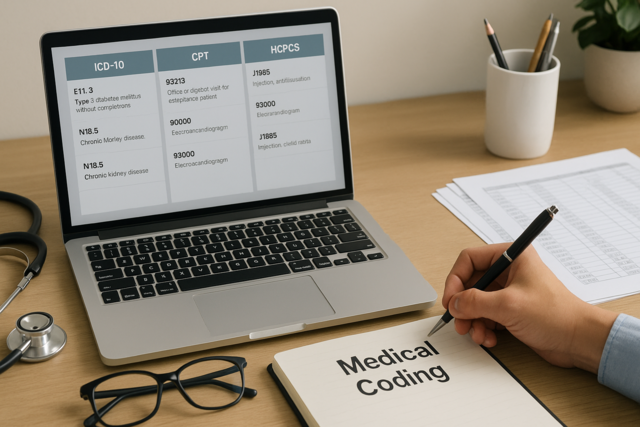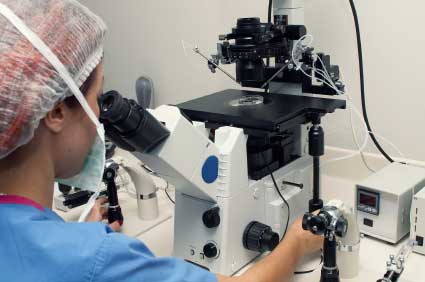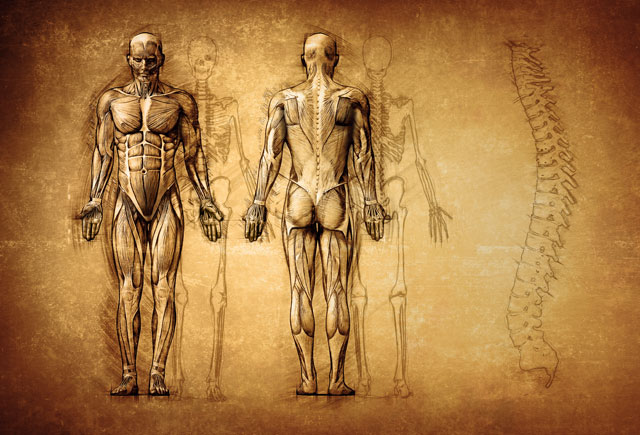In the fast paced computer generation, medical coding has become an essential. Codes in the medical field are alpha-numeric identifications of illnesses and diseases, treatments, medications, and other medical information collected in the diagnosis and treatment of a patient. Medical codes are useful in two ways: (1) obviously, the first way is the fast abbreviation of long medical nomenclature; (2) the codes make it easier for insurance claims to be processed and paid.
The medical coder is a highly skilled keyboard operator who can work accurately under deadline pressure. To further complicate the matter, the medical codes change from time to time and medical coders must keep abreast of the most recent information.
In this article we will look at the medical coder's responsibilities in relation to the treatment of patients and the filing of insurance claims for re-imbursement.
QUALIFICATIONS
The medical coder may be a singular position in a healthcare facility or may be a combination of coder/biller. The medical coder must be a methodical person with fast and accurate keyboard skills. That person must also be able to familiarize himself or herself with industry software and be able to use it well. The medical coder must be able to stay informed on any changes in the coding system and any variations that may occur from company to company. The medical coder must be familiar with medical terminology in order to translate those terms into usable codes. The medical coder must also be able to spot inaccuracies on billing and medical history forms. Physicians and medical administrators will be looking for qualities of dependability and a history of being able to do work largely unsupervised.
DUTIES AND RESPONSIBILITIES
Duties and responsibilities of the medical coder are narrower than for other administrative personnel in the healthcare office. The primary responsibility is entering correct codes for medical conditions, diseases, treatments, and medications. There are two main categories of medical codes and several variations for specialized fields of practice. The AMA (American Medical Association) CPT (Current Procedural Terminology) codes are the primary procedure codes. HCPCS (Healthcare Common Procedural Coding System) generally represents items, supplies and equipment, prosthetics and orthotics, injectable drugs, and non-physician services not covered in the CPT codes. HCPCS codes are updated annually except for temporary codes beginning with G, K, or Q. It is the responsibility of the medical coder to stay informed on all of these. In addition to knowing the medical procedure codes, the medical coder must also be able to use the NDC (National Drug Codes) to report prescription and pharmacy transactions. Also, the medical coder must master the ICD-9-CM (International Classification of Diseases) codes.
These codes will be entered into medical histories and onto insurance claim forms. Furthermore, on the claim forms, the codes must be listed in "batched" groups that relate to the same treatment and medical procedure for the same patient. Incorrect forms or entering codes out of place will cause the claim to be sent back and possibly denied. It is the responsibility of the medical coder to see that errors such as those are kept to an absolute minimum.
There are specialized coding areas for dentistry and chiropractic medical services that come in the form of supplements to the CPT. In some cases, submitting these codes to insurance companies or government financed medical assistance programs may vary from the physician/clinic/hospital submissions.
The medical coder needs to understand RVS (Relative Value Studies) codes widely used by insurance and government reimbursement programs to evaluate charges relative to the complexity of each procedure, the amount of skill needed to perform the procedure, and the amount of time estimated to do the procedure. These codes are used to re-imbursement agencies to prevent overcharging for services rendered.
EDUCATIONAL REQUIREMENTS
It is not mandatory that the medical coder own a certificate, associate degree, or bachelor's degree though, of course, those who have such education will be able to demand higher salaries. Advanced schooling is helpful also to the medical coder who wishes to branch out into entrepreneurship and operate a medical coding service from a home office.
WORK ENVIRONMENT
As with medical billers, the work environment for the medical coder depends on where the work is done. Healthcare facilities are usually well-lighted and comfortable, with attractive furnishings. Since other professional administration personnel work in the office also, the social environment is usually of a high caliber. On the other hand, the medical coder who works out of a home office is free to make the work environment to personal taste, setting it up so that there is a minimum of distraction. Because the work requires long hours of sitting at a computer monitor and keyboard, the usual physical maladies associated with that kind of activity are likely. The home office probably offers a greater opportunity of periodic breaks and light exercise to minimize bad side effects caused by the job.
COMPENSATION
The critical nature of the job allows for higher salaries, often in the range of $40,000 per year. The full-time medical coder who works in a healthcare facility may also have added free medical benefits. In some medical offices, employees are required to wear uniforms (usually hospital scrubs) and a stipend is paid for that expense. Like the medical biller, however, more and more of the healthcare coding work is going to internet businesses which can offer volume prices, fast turn around, and electronic access to patient medical records for physicians. Insurance claims procedures are simplified with a smaller margin of human error. The accomplished medical coder may find greater compensation in operating as a free lance coder handing more than one medical practice client.
SUMMARY
The position of medical coder does not enjoy the prospective growth rate of other areas in medical facility administration because more and more it is being farmed out to independent contractors and medical billing and coding companies. However, whether in an office or in a specialized company, the demand for those people with the personal skills and knowledge associated with medical coding will always be present. As noted, it is an area that offers the possibility of entrepreneurship which might be very attractive to certain types of individuals.






























